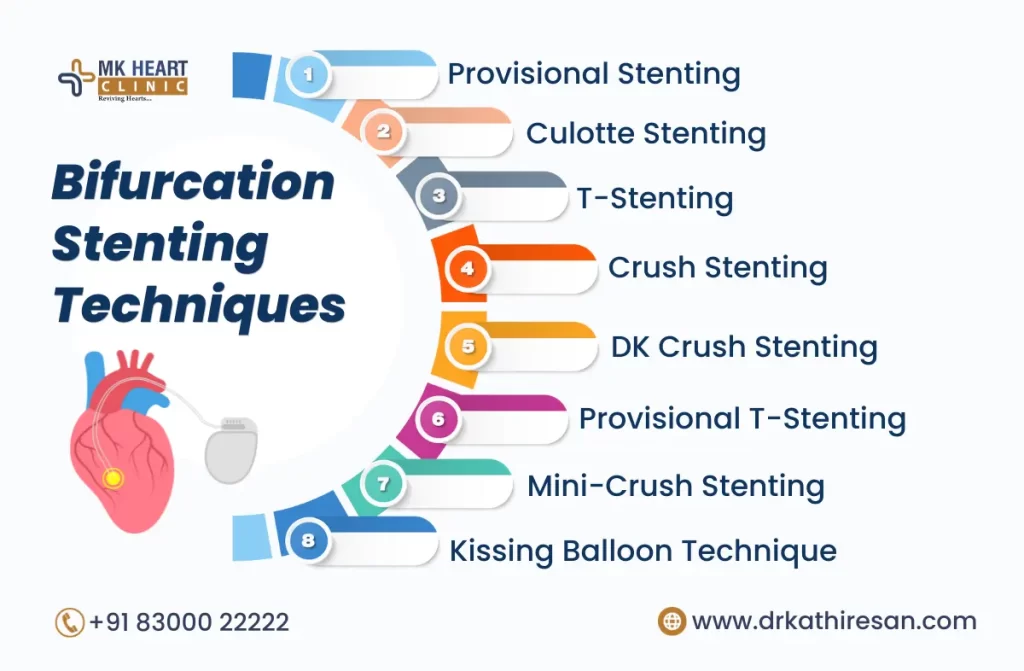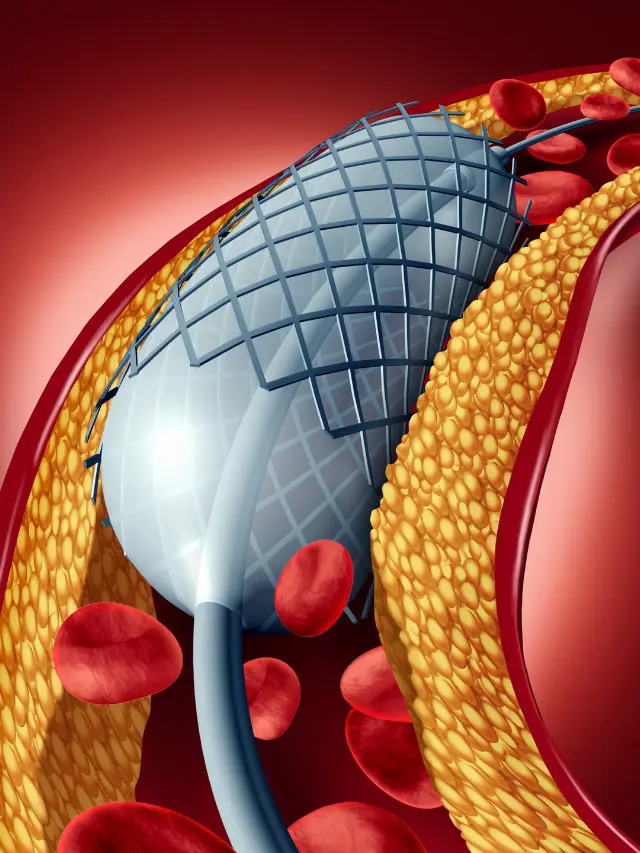Bifurcation stenting in Chennai refers to a medical procedure where a stent is used to treat a narrowing or blockage at a blood vessel’s branching point, known as a bifurcation. This minimally invasive technique is commonly performed at various healthcare facilities in Chennai to restore proper blood flow and alleviate cardiovascular issues.
What is Bifurcation stenting?
Bifurcation stenting in Chennai is a medical procedure used to treat a type of coronary artery disease where there is a narrowing or blockage at the point where a main coronary artery (the parent vessel) branches into two smaller arteries (the daughter vessels). This bifurcation occurs when the coronary arteries divide into smaller branches to supply blood to different areas of the heart.
During a bifurcation stenting procedure, a stent, which is a small, mesh-like tube, is placed in the parent vessel and sometimes in one or both of the daughter vessels to widen the narrowed or blocked area and improve blood flow to the heart muscle.

Causes of Bifurcation stenting
Bifurcation stenting in Chennai is a medical procedure used to treat blockages or narrowing in blood vessels that occur at a point where a single vessel divides into two branches, forming a “bifurcation.” This procedure involves the placement of stents to open up and support the blocked or narrowed area.
- Atherosclerosis: The most common cause of bifurcation stenosis is atherosclerosis, a buildup of fatty plaques in the arteries. When these plaques narrow or block the artery at the bifurcation point, it can impede blood flow to both branches, necessitating stent placement.
- Coronary artery disease: Bifurcation stenting is often performed in the context of coronary artery disease. When the coronary arteries, which supply blood to the heart muscle, become narrowed or blocked at a bifurcation site, it can lead to angina (chest pain) or even a heart attack.
- Restenosis: In some cases, patients who have previously undergone coronary stent placement may develop restenosis, which is the re-narrowing of the stent or the artery near the stent. Restenosis can also occur at bifurcation points, requiring further intervention, such as additional stent placement.
- Complex lesions: Bifurcation lesions can be complex, with multiple plaques and obstructions at the point where a vessel divides.
Who is the Right Doctor for Bifurcation stenting?
Dr. M. Kathiresan is a well-known interventional cardiologist with expertise in bifurcation stenting in Chennai. He is widely recognized for his skills in performing complex interventional cardiology procedures, including those involving bifurcation stenting. If you are looking for a highly experienced and qualified cardiologist to perform a bifurcation stenting procedure in Chennai, Dr. M. Kathiresan would be an excellent choice.
Treatment for Bifurcation Stenting in Chennai
Bifurcation stenting is a medical procedure used to treat blockages or narrowing in the coronary arteries where they branch or bifurcate. The goal of this procedure is to improve blood flow to the heart muscle by placing stents in the affected areas.
- Diagnostic Angiography: Before the stenting procedure, a coronary angiogram is typically performed to visualize the location and severity of the blockages in the coronary arteries.
- Lesion Assessment: The physician will assess the specific bifurcation lesion, which is the point in the artery where it branches. They will determine the type and complexity of the bifurcation, which may include true bifurcations, side branches, and other features.
- Stent Selection: Based on lesion assessment, the interventional cardiologist will choose appropriate stents and guide wires for the procedure. Bifurcation stenting in Chennai often requires specialized equipment and techniques, including dedicated bifurcation stents or two regular stents.
Benefits of Bifurcation stenting
Bifurcation stenting in Chennai is a medical procedure used to treat coronary artery disease, where a significant blockage occurs at the junction of two blood vessels, often referred to as a bifurcation. This procedure involves the placement of stents in both the main vessel and the branch vessel to ensure adequate blood flow to the heart muscle.
- Improved blood flow: Bifurcation stenting techniques help restore normal blood flow to the heart muscle by addressing blockages at the site where a main artery divides into two branches. This can relieve symptoms of angina (chest pain) and improve overall heart function.
- Reduced risk of complications: Without intervention, bifurcation lesions can lead to more serious coronary events, such as heart attacks. Bifurcation stenting reduces the risk of these complications by opening up the blocked arteries.
- Preservation of side branches: Bifurcation stenting allows for the treatment of the main artery and the branch vessel simultaneously, preserving the blood flow to both areas. This is important because some bifurcations involve side branches that supply critical areas of the heart.
Risks of Bifurcation stenting
Bifurcation stenting in Chennai is a medical procedure used to treat blockages or narrowing in blood vessels, particularly in areas where a single vessel branches into two smaller ones, forming a “bifurcation.” This procedure involves the placement of stents (small mesh tubes) to help open and support the blocked or narrowed vessel. While bifurcation stenting techniques can be an effective treatment, it does come with certain risks and potential complications. Some of these risks include:
- Restenosis: Restenosis is the re-narrowing of the treated blood vessel, which can occur after stent placement.
- Thrombosis: Blood clots can form on or around the stent, potentially leading to blockages that may cause heart attacks or strokes.
- In-stent restenosis: This is a specific type of restenosis where the blockage occurs inside the stent itself, limiting blood flow.
Conclusion
Bifurcation stenting in Chennai is a medical procedure used to treat atherosclerotic lesions or blockages that occur at the point where a major blood vessel branches into two smaller vessels, forming a bifurcation. These bifurcations are commonly found in arteries, and when they become narrowed or blocked due to the buildup of plaque, it can lead to reduced blood flow and potentially life-threatening complications like heart attacks and strokes.


